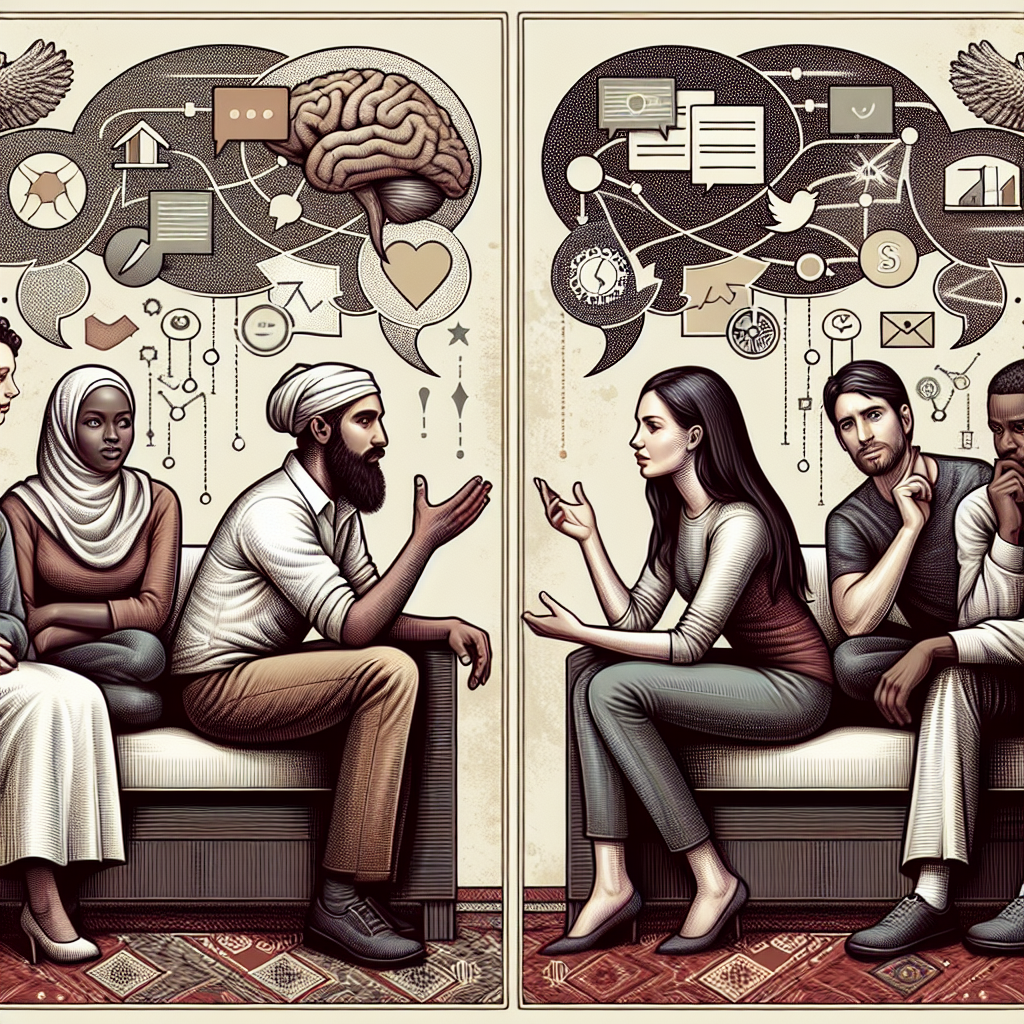Make your appointment now
Communication is the lifeblood of any relationship.
It's the bridge that connects two individuals, allowing them to share their thoughts, feelings, and experiences.
But what happens when that bridge starts to crumble? Misunderstandings arise, conflicts escalate, and the bond weakens.
This is where the importance of better communication in relationships comes into play. It's not just about talking more, but talking better.
This guide will provide you with actionable strategies to improve your relationship communication skills. It will help you understand how to express your needs, listen actively, and resolve conflicts constructively.
You'll learn how to strengthen communication in your relationship, creating a safe space for open dialogue. You'll discover how to talk to your partner in a way that fosters understanding and empathy.
Whether you're looking to improve communication with your partner, or you're a professional seeking insights into communicative relationships, this guide is for you.
So, are you ready to bridge the gap and foster a deeper connection with your partner? Let's dive in and explore how to communicate better in a relationship.
Effective communication is the core of a strong relationship. It's about more than just exchanging words. It involves truly understanding your partner's feelings and thoughts.
When communication fails, relationships can suffer. Misinterpretations and assumptions fill the void, leading to unnecessary conflicts. Thus, keeping the communication lines open is essential.
Good communication builds trust and intimacy. It fosters a sense of security where both partners feel heard and valued. This emotional connection strengthens the bond, allowing love to grow.

The Fundamentals of Relationship Communication Skills
Mastering the basics of communication is crucial for any successful relationship. It involves more than talking and listening. It is about engaging with your partner on a deeper level.
Developing strong communication skills requires practice and patience. It starts with learning to express yourself clearly. Speaking openly about your thoughts creates an atmosphere of honesty.
Understanding your communication style is vital. Everyone communicates differently and recognizing these differences can enhance interactions. Adaptability is important to meet each other's needs.
Nonverbal cues also play a significant role. Facial expressions, gestures, and tone of voice can convey much more than words. Being aware of these can prevent miscommunication.
Finally, mutual respect and empathy underpin effective communication. Valuing each other’s perspectives encourages a more understanding and supportive partnership. These fundamentals lay the foundation for a healthy relationship.
Active Listening: The Heart of Dialogue
Active listening is a cornerstone of meaningful dialogue. It involves focusing entirely on your partner's words. It's about understanding, not just waiting for your turn to speak.
When you actively listen, you show genuine interest in your partner's thoughts. This can enhance the bond between you. It can also prevent misunderstandings, as you'll grasp their true intent.
Practicing active listening involves maintaining eye contact and using affirmative gestures. Nodding or providing verbal affirmations lets your partner know they're heard. These simple actions can greatly improve relationship dynamics.
Expressing Yourself Clearly and Respectfully
Clear and respectful expression is essential for nurturing intimacy. Start by using simple, direct language. Avoid jargon or ambiguous statements to prevent confusion.
"I" statements are powerful tools. Instead of blaming, they allow you to express how actions impact you. This approach fosters understanding without triggering defensiveness.
Respectful expression requires patience and tact. Choose the right moment to address sensitive topics. Calm settings promote open dialogue, encouraging both partners to engage wholeheartedly.
Strategies to Strengthen Communication in Your Relationship
Improving communication takes dedication but offers rewards. Start by setting regular times to talk without distractions. These moments strengthen the bond and ensure all voices are heard.
Listen actively to what your partner says, and respond mindfully. Avoid interrupting or assuming you understand before they finish. This will enhance understanding and connection.
Adopt a positive mindset when discussing difficult topics. Focus on finding solutions rather than assigning blame. This approach nurtures a supportive and loving environment.
Be mindful of nonverbal cues like tone and gestures. These can convey intent and emotions beyond words and help avoid misunderstandings. Paying attention to them can greatly improve interactions.
Flexibility and patience are key. Each situation and conversation is different, requiring you to adapt your communication style. This willingness fosters a harmonious and resilient partnership.
The Power of "I" Statements and Avoiding Blame
"I" statements can transform how partners communicate. They focus on personal feelings rather than pointing fingers. This technique prevents defensiveness and promotes constructive dialogue.
By saying, "I feel," you articulate your emotions and encourage understanding. This approach opens avenues for empathetic responses from your partner. It lays the groundwork for a productive conversation.
Avoiding blame by using "I" statements encourages responsibility without hostility. It helps both parties express needs without escalating tension. This creates a nurturing environment for problem-solving and growth.
Creating a Safe Space for Open Dialogue
Establishing a safe space is crucial for fostering open dialogue. This involves creating an environment where both partners feel comfortable sharing. Trust and respect are fundamental in achieving this.
Make sure your partner knows their thoughts will be heard without judgment. Set the intention to listen and engage without interruptions. This sense of safety promotes openness and honesty.
Privacy and timing also play a role in creating this space. Choose a quiet moment when you both can be present. This demonstrates respect for each other's feelings and encourages deeper conversations.
Regular Check-Ins: Keeping the Communication Flowing
Regular check-ins help maintain communication flow within a relationship. They provide structure to discussions and ensure issues are addressed promptly. This consistency strengthens the bond over time.
These sessions don't have to be formal or lengthy. A casual conversation over coffee can suffice. The key is to make them a habitual part of your routine.
Use these opportunities to express appreciation and concerns alike. Celebrating successes reaffirms positive aspects, while addressing issues prevents them from festering. This balanced approach fosters a healthy communicative relationship.
Navigating Conflict with Constructive Communication
Conflicts are inevitable in any relationship. However, how you handle them defines the strength of your bond. Address disagreements openly and calmly to foster resolution and understanding.
Begin by acknowledging the problem without exaggeration. Keep your focus on the issue, avoiding personal attacks. This minimizes defensiveness and sets the stage for productive discussion.
Maintain a respectful tone, even in the heat of the moment. Offer your views while being open to your partner's perspective. This mutual respect is foundational for finding solutions.
Communication during conflict is not about winning but understanding each other. Aim to identify shared interests that might be overlooked. This shift in perspective can pave the way for compromise.
Finally, reflect on conflicts to learn and grow together. Discuss what led to the disagreement and how it was handled. This reflection helps to prevent future disputes and enhances the overall relationship.
De-escalating Arguments and Finding Common Ground
When tensions rise, quick action is needed to de-escalate. Begin by taking a deep breath and pausing the conversation if needed. This moment of calmness can prevent words you might regret later.
Engage with a softer tone and reduced volume. These changes can significantly alter the mood and encourage a more rational discussion. It signals a willingness to resolve rather than to fight.
Finding common ground is vital. Highlight areas where you agree, and use them as a base for further talks. This focus can redirect energy from conflict to cooperation and mutual understanding.
The Role of Empathy in Resolving Disputes
Empathy plays a crucial role during disputes. It involves putting yourself in your partner's shoes to understand their feelings. This viewpoint reduces conflict intensity and fosters compassion.
Listen intently to your partner's emotions, not just their words. Acknowledge their feelings and validate their experiences. This effort makes them feel heard and respected, easing tension.
Approach disputes with genuine care and concern. Using empathy can transform how you address issues together. It paves the way for healing conversations and deeper emotional connections.
Enhancing Nonverbal Communication and Recognizing Cues
Nonverbal communication plays a vital role in relationships. It conveys emotions and intentions beyond words. Understanding these cues can deepen your bond and prevent misunderstandings.
Pay attention to body language, such as posture and gestures. A simple touch or an affectionate look can communicate care and love. These signals often speak louder than words.
Facial expressions and eye contact are powerful tools in communication. Observing them can provide insight into your partner's true feelings. Consistent eye contact, for example, can foster trust and openness.
Being aware of tone of voice and pace of speech is also essential. These aspects can reveal emotions like annoyance, joy, or hesitation. Recognizing these subtle cues helps in responding more empathetically.
By being attuned to your partner’s nonverbal signals, you create a harmonious connection. This awareness enables better understanding and enhances intimacy. The power of these unspoken messages should never be underestimated.
How to Communicate Better with Your Partner During Stressful Times
Stress can strain even the strongest relationships. During such times, clear communication becomes more crucial than ever. Expressing feelings openly helps reduce misunderstandings and fosters support.
Begin by acknowledging the stress you're facing. This could be personal stress or a shared situation. Identifying the source can set the stage for an honest discussion. It’s important to voice not just your concerns, but also your needs.
Practice active listening as your partner shares their own challenges. Show empathy and avoid rushing to solutions or judgments. Sometimes, simply being heard can be incredibly comforting and supportive.
Finally, collaborate on finding practical solutions together. Both partners should feel involved in the resolution process. This enhances your bond and helps manage stress collectively. By uniting through open dialogue, you strengthen your relationship even in tough times.
The Impact of Patience, Timing, and Approach in Delicate Conversations
Delicate conversations require care and precision. Patience is crucial when discussing sensitive topics. It allows both partners to express themselves without feeling rushed or pressured. Waiting for the right moment can prevent unnecessary tension.
Timing plays a significant role in effective communication. Choosing the right time to initiate a delicate conversation can make a big difference. Avoid bringing up sensitive issues when your partner is stressed or preoccupied. Instead, select a calm moment when both of you can be fully present and engaged.
Approach matters just as much as timing. Gentle and respectful language fosters an atmosphere of trust. Begin with positive affirmations or shared goals to set a constructive tone. This approach helps your partner feel safe, which encourages openness and honesty. By combining patience, timing, and a considerate approach, you can navigate challenging conversations more smoothly and productively.
Adapting Communication Styles for Different Situations
Communication is not one-size-fits-all. Different situations call for unique approaches. Understanding when to adapt your style is key. For instance, a light-hearted tone may suit relaxed discussions but not serious matters.
Being flexible in communication can enhance understanding. When faced with emotional topics, a gentle and empathetic approach helps. It's important to match your partner's emotional state and needs. Flexibility shows you respect their feelings and perspective.
Adapting your style can also mean adjusting your pace or choice of words. Sometimes, slowing down and using simpler language aids in clarity. In other cases, being more direct is necessary for efficiency. Recognizing the demands of each situation and adjusting accordingly can strengthen your relationship. It fosters an environment where both partners feel valued and understood.
Personal growth plays a vital role in enhancing relationship communication. As individuals evolve, they better understand their needs and desires. This self-awareness translates into clearer and more effective communication with their partner.
When both partners focus on personal growth, the relationship benefits. It fosters an environment of mutual respect and understanding. Learning new skills or expanding emotional intelligence can lead to more meaningful dialogues. These changes can inspire deeper connections and insights into each other's perspectives.
Additionally, personal growth encourages adaptability and open-mindedness. It helps partners navigate different communication challenges and conflicts. Embracing personal development allows partners to support and motivate each other. This shared journey strengthens the communicative bond, making the relationship more resilient and fulfilling. Investing in oneself is, therefore, an investment in the relationship.
Sometimes, despite best efforts, communication in a relationship hits a wall. Recognizing these moments is crucial. It may be time to seek professional guidance if conversations often lead to misunderstandings or stress.
Therapists and counselors provide unbiased insights. They offer techniques that are tailored to a couple’s specific needs. This external support can illuminate patterns that partners may overlook themselves.
Reaching out for help demonstrates commitment to improvement. It shows willingness to invest in the relationship’s future. Professional guidance can deepen understanding, helping partners to communicate in healthier, more productive ways. Thus, getting external help isn't a sign of failure; it's a proactive step towards a stronger, communicative partnership.
Improving communication in a relationship is an ongoing process. It requires patience, effort, and a strong desire to understand each other better. By acknowledging that communication is dynamic, partners can approach it with a mindset of growth.
Commitment to communication means embracing both the highs and lows together. It involves recognizing the value of each interaction as an opportunity to learn and connect more deeply. This commitment builds a foundation of trust and mutual respect.
Every conversation is a chance to reinforce or adjust communication habits. Consistent effort in this area pays off over time. A commitment to continuous improvement ensures that the relationship remains resilient, adaptable, and nurturing, even as challenges arise. Such dedication brings partners closer, fostering an enduring bond rooted in understanding and love.
To enhance your communication skills in a relationship, numerous resources can help. Books on relationship dynamics, such as "The Five Love Languages," offer valuable insights. These materials can provide both inspiration and practical advice.
Online courses and workshops also offer structured learning opportunities. Platforms like Coursera and Udemy have courses on improving communication skills. Engaging with these resources can facilitate growth and understanding in your relationship.
Make your appointment now
Over the years, the infatuation often gives way to living side by side as partners. In everyday life with children, a career and different leisure activities, you lose the connection.


Susana and Markus Kessler have been in a happy relationship for more than 25 years. To ensure that their partnership continues to grow, they have repeatedly attended coaching and training sessions on all aspects of their relationship, including communication, money management and parenting.
They have built up several businesses and have become financially free as a result. They have also attended countless coaching and training sessions for their business on sales, marketing, social media, business development and investing.
They have been trained coaches since 2015 and are passionate about passing on their knowledge. Their coaching approach is practical, solution-oriented and individually tailored to the needs of their clients. They offer comprehensive support in the areas of personal development, relationship building and maintenance, financial education and entrepreneurial growth.
Susana and Markus offer various coaching formats to ensure maximum flexibility for their clients. These include:
With their many years of experience and in-depth knowledge, Susana and Markus Kessler help people to strengthen their relationships and make the most of their lives and opportunities.

Our knowledge comes from 25 years of relationship experience as well as training and further education with the world's best in their field, including the NLP Academy Switzerland, J.T. Foxx, T. Harv Eker, Landmark Wordwide, John Kehoe, Maja Storch and many more.

Every partnership is different. We recognize your individual personalities and work with your own resources to support you perfectly on your path to the perfect partnership.

Anyone who talks about their relationship deserves absolute discretion and an atmosphere of trust. That's why we offer you an empathic environment in which you feel safe and secure and can speak openly with each other.